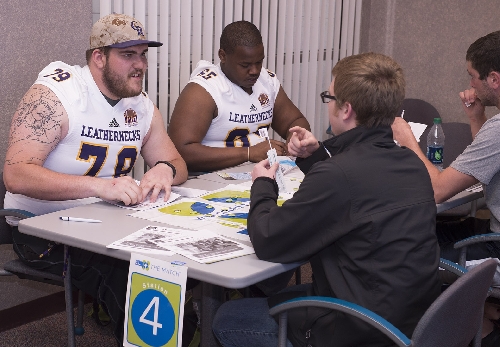University News
WIU Football Player Heeds the Call
April 27, 2015
MACOMB, IL -- Western Illinois University Leatherneck Defensive Lineman Jordan (JJ) Veloz is about to get perhaps the biggest play of his life … tackling a rare immune disorder.
Veloz, a sophomore exercise science major from Oak Creek, WI is fine, but an infant in another state is not. And that's where Veloz steps up to the line. Later this summer, the 20-year-old will travel from Macomb to his home state to donate bone marrow to an ailing child. Veloz signed up to be a bone marrow donor in April 2014 as part of the WIU Be the Match on Campus chapter's and the WIU Football team's "Get in the Game. Save a Life." bone marrow registry drive held on Western's campus. The "Get in the Game" drive, which is a national initiative that began in 2008 by Villanova Coach Andrew Talley, is designed to build the National Bone Marrow Donor Registry. WIU's chapter and the football team again joined forces to host a registry drive April 23 on the Macomb campus. Approximately 311 individuals registered.
"When we partnered last year with the WIU chapter of Be the Match, I had never heard of Be the Match or the bone marrow registry," Veloz said. "But the thing that made me want to register was just the thought if I were in need of a donation or one of my family members were in need. That thought made it a pretty easy decision to register."
According to Veloz, registering is simple. It takes just about 15-20 minutes. After completing the required paperwork, a few swabs are taken from the inside of a donor's mouth and the DNA goes into the national bone marrow registry. Veloz was first contacted about being a possible match in March and from there, he had additional blood tests completed to ensure he was indeed a match.
"On April 9, I got the call that told me I was a match," he said. "In the near future, I will complete the bone marrow donation for an infant who lives in another state."
He said the risk is minimal, but even if the risk higher, he'd still be in the game.
"It hasn't really hit me yet, but I feel like I am just doing what I should do. But there are times I stop and think 'Wow, it is all in my hands,'" Veloz reflected. "But when I received that call April 9, I didn't hesitate. I would not be able to live with myself knowing I had the chance to save a life and I didn't follow through. Even if there is some pain or risk involved, I will do it again if I get another call."
While Veloz doesn't know the infant or the family, he hopes that in a few years he'll be able to meet the child who benefits from the transplant. Even though he won't meet the child and the family right away, he hopes to be kept apprised of the child's condition.
"I hope when people hear about my story they feel inspired enough to go out and get registered," Veloz said. "You never know when you or someone you know will need help, and if you get a chance to help someone else, why wouldn't you? You have the opportunity to give the greatest gift: life, and I believe it is our duty as human beings to do whatever we can to make not only our lives, but others' lives better as well."
Be The Match Registry/Be the Match on Campus is operated by the NMDP, a nonprofit organization dedicated to creating an opportunity for all patients to receive the marrow transplant they need, when they need it. It is the largest and most diverse donor registry in the world.
"A child will have a second chance because JJ joined and said 'yes' when he was called upon," said Amy Brousseau, community engagement representative for Be the Match. "My heart is sincerely full."
According to Grant Severs, the president and co-founder of WIU's Be the Match chapter, a patient's likelihood of finding a matching donor on the Be The Match Registry is estimated to range from 66-93 percent. Each year more than 12,000 patients are diagnosed with a life-threatening disease, such as leukemia, whose best hope for a cure is a marrow transplant. Patients who have no matching marrow donor within their families often turn to the Be the Match registry program.
For more information, visit bethematch.org.
Posted By: Darcie Shinberger (U-Communications@wiu.edu)
Office of University Communications & Marketing



Connect with us: